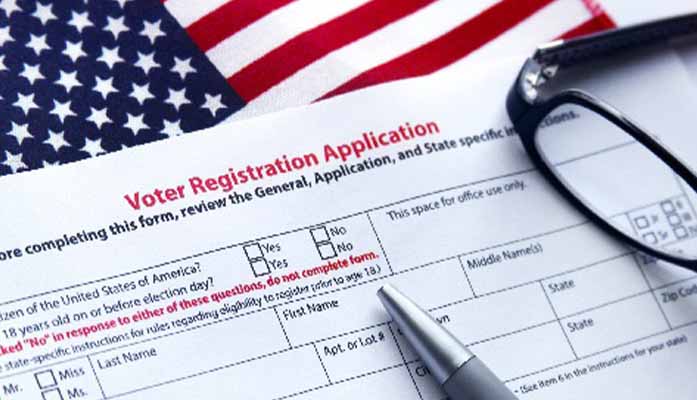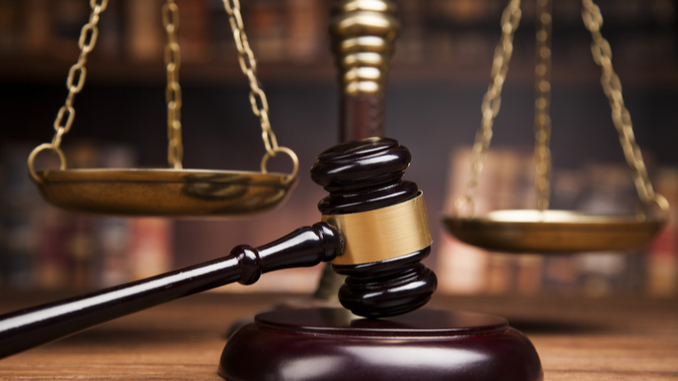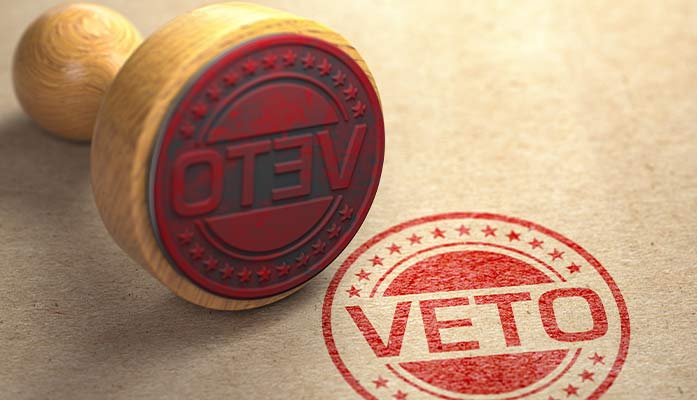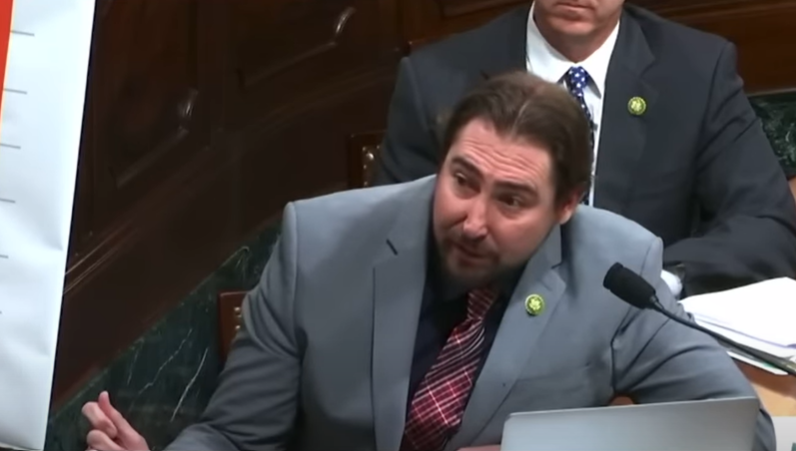
by Staff Reporter | Apr 13, 2025 | News
By Staff Reporter |
The Trump administration will no longer continue its legal challenge to Arizona’s documentary proof of citizenship (DPOC) laws.
The Department of Justice (DOJ) filed a brief on Tuesday motioning to drop the case.
Assistant Attorney General Harmeet Dhillon filed the brief the very day after she was sworn into her position within the Civil Rights Division, alongside the controversial Interim Attorney for the United States Attorney’s Office for the District of Arizona, Timothy Courchaine.
Senate President Warren Petersen called the development “a major win for election integrity and the rule of law” in a statement Wednesday. Petersen previously submitted a letter to the DOJ requesting they drop the case.
“The @azsenategop and @azhousegop will continue to defend this law against the special interest groups challenging it,” said Petersen.
Petersen submitted his request letter to Attorney General Pam Bondi in mid-February.
The case, Mi Familia Vota v. Fontes, is before the Ninth Circuit Court of Appeals.
Arizona’s DPOC laws required automatic rejection of Arizona state form registration submissions lacking DPOC, prohibited individuals who hadn’t provided DPOC from voting for a president or returning a ballot by mail, and added mandatory fields to the state registration form for a registrant’s birthplace and a checkbox confirmation of the applicant’s U.S. citizenship.
Last August, the Ninth Circuit Court of Appeals ruled Arizona would have to accept state voter registration forms without DPOC.
Tuesday’s motion by the DOJ was the latest in the Trump administration’s efforts to cease legal action against states’ election laws.
Last month, the DOJ dropped multiple election-related lawsuits in Texas, Georgia, and Louisiana initiated under the Biden administration. Those lawsuits opposed voting maps and election integrity initiatives, respectively.
President Donald Trump and his administration have also taken steps to require proof of citizenship in elections, prompting resistance from the state’s top Democratic leaders.
Arizona Secretary of State Adrian Fontes, alongside Attorney General Kris Mayes, filed a lawsuit against the Trump administration over President Donald Trump’s recent executive order requiring DPOC to register to vote in federal elections as well as requiring all ballots to be received by Election Day.
Last week, Mayes and Fontes held a joint press conference announcing their lawsuit and accusing Trump of “unconstitutional intrusion” on states’ rights and congressional authority regarding elections. The pair want Trump to go through — not around — Congress for any election law changes.
“If President Trump wanted to make laws then he should have run for congress where the U.S. Constitution says that work is done,” said Fontes. “If the President wants to reshape our elections, he must propose realistic bipartisan legislation in Congress instead of forcing states into unfunded mandates through unlawful executive orders.”
“Clearly, Trump only supports state’s rights when it suits him,” said Mayes.
Last month in another case pertaining to DPOC, the Arizona Court of Appeals ruled against the Elections Procedure Manual (EPM) produced by Secretary of State Adrian Fontes. Fontes’ EPM would have allowed voters who failed to submit or couldn’t achieve verification of their DPOC.
AZ Free News is your #1 source for Arizona news and politics. You can send us news tips using this link.

by Jonathan Eberle | Apr 12, 2025 | News
By Jonathan Eberle |
Arizona Senate President Warren Petersen has joined a coalition of states and energy companies in filing a federal lawsuit aimed at reducing regulatory barriers to deploying small modular nuclear reactors (SMRs), a next-generation nuclear energy technology touted for its safety, efficiency, and potential role in transitioning to clean energy.
Filed in a U.S. District Court late Monday, the lawsuit challenges a longstanding Nuclear Regulatory Commission (NRC) rule that subjects SMRs to the same licensing standards as large-scale nuclear reactors. Arizona joins Florida, Texas, Louisiana, Utah, and three nuclear energy firms in asking the court to set aside the rule.
“Arizona’s utility companies want to pursue SMRs, but their hands are tied with red tape,” Petersen said in a statement. “It could take decades and an unreasonable amount of money to establish plants under the current rule.”
The plaintiffs argue that the NRC’s approach contradicts the original intent of Congress, which in the 1950s envisioned a more flexible regulatory framework for smaller reactors. They contend the uniform standards are outdated and unnecessarily hinder the adoption of SMRs, which can be factory-built and installed on-site, even in rural areas.
Small modular reactors are advanced nuclear energy systems that produce significantly less power than traditional reactors—typically under 300 megawatts—but offer key advantages. They can be constructed more quickly, pose fewer safety risks, and emit nearly zero greenhouse gases. Because of their modular design, SMRs can be scaled to meet specific energy demands and are considered ideal for hard-to-reach communities or states looking to diversify their energy portfolios.
Proponents say SMRs could be a critical tool in meeting emissions targets while maintaining grid reliability and reducing dependency on fossil fuels.
The push to modernize nuclear regulation has gained traction as several states and energy companies look to expand nuclear energy options. Advocates of the lawsuit argue that reforming the licensing process could unlock billions in clean energy investment and accelerate the path toward energy independence.
Arizona’s involvement in the case reflects a broader interest among state leaders in expanding energy choices amid rising demand. Petersen’s office noted that the lawsuit aligns with broader national efforts to reduce reliance on foreign energy. For now, Arizona joins a growing list of states pushing for a regulatory framework they say better reflects technological innovation and evolving energy needs.
Jonathan Eberle is a reporter for AZ Free News. You can send him news tips using this link.

by Jonathan Eberle | Apr 12, 2025 | Education, News
By Jonathan Eberle |
A bill designed to direct more tax revenue toward Arizona’s K-12 classrooms has been vetoed by Governor Katie Hobbs, prompting criticism from Republican lawmakers who say the measure would have strengthened public education funding.
SB 1050, sponsored by Senator Vince Leach (R-LD17), sought to amend the Government Property Lease Excise Tax (GPLET) program by prohibiting the abatement of school district-designated tax revenues. Under current law, cities and towns can lease government-owned property to private developers with reduced tax obligations, an incentive intended to promote commercial development.
The bill would have excluded school-related tax revenues from such incentives, allowing those funds to flow directly to local school districts instead of being waived under development agreements.
“This was a missed opportunity by the Governor,” said Leach. “She says she supports education funding, but her veto suggests otherwise.”
In her veto letter, Governor Hobbs explained that SB 1050 could “stunt Arizona’s economic development” by weakening a tool used by local governments to attract private investment. The GPLET program, though controversial, has been credited with revitalizing parts of urban Arizona by lowering upfront development costs in exchange for long-term gains.
Arizona schools continue to face funding pressures despite recent increases to the state’s education budget. Republican lawmakers have often pushed for reallocating existing tax revenues, while Democrats have generally sought new funding sources or changes to the state’s tax structure.
SB 1050 passed both legislative chambers before being vetoed, signaling at least some bipartisan concern about the balance between development incentives and education funding.
Senator Leach and other supporters of the bill may pursue similar legislation in future sessions or attempt a veto override, although success would require significant bipartisan support. Meanwhile, the broader debate over how to equitably fund Arizona’s public schools is likely to continue.
“This is about priorities,” Leach said. “We should be making sure our tax dollars are going to classrooms, not corporate subsidies.”
The Governor’s office has not indicated whether alternative proposals to increase school funding through tax reforms are in the works.
Jonathan Eberle is a reporter for AZ Free News. You can send him news tips using this link.

by Matthew Holloway | Apr 11, 2025 | Education, News
By Matthew Holloway |
A bill sponsored by Arizona State Representative Leo Biasiucci (R-LD30) HB 2164 to ban several food dyes and toxic chemicals from foods served in Arizona schools passed the Arizona Senate unanimously on Tuesday. At the time, actor-turned-conservative activist Rob Schneider and Secretary of Health and Human Services Robert F. Kennedy, Jr. were visiting the Capitol as part of the ‘Make America Healthy Again’ tour.
Both Kennedy and Schneider joined Biasiucci at the Capitol in Phoenix with the Representative posting to X, “It was honor to have @SecKennedy visit the Arizona Legislature today as my bill to ban toxic food dyes from schools passed 28-0 in the Senate. I look forward to doing whatever I can to help him Make America Healthy Again!”
If signed into law, the bill would ban foods on school campuses which are deemed to be harmful. When the bill was announced in February, Biasiucci stood beside Senate Majority Leader Janae Shamp (R-LD29) and Superintendent of Public Instruction Tom Horne and explained the ban to include foods found to contain ingredients that scientific studies have found to be harmful to students health, including potassium bromate, propylparaben, titanium dioxide, brominated vegetable oil, yellow dyes 5 and 6, blue dyes 1 and 2, red dyes 3 and 40, and green dye 3.
“Our kids deserve better than artificial dyes and cheap fillers in their lunches. If we’re providing meals at school, they should be real, nutritious food—not the kind of processed junk that’s banned in other countries. This bill puts the health of Arizona’s children first, plain and simple,” Biasiucci said at the time.
Posting to X after the vote Schneider wrote, “Thank YOU to ALL the legislators in Arizona on BOTH sides of the aisle for putting the HEALTH of CHILDREN before partisan politics…”
“I would like to first thank the Democrats in the state legislature here for joining Republicans unanimously for doing what’s best for our children,” said Biasiucci. “This is not partisan, this is people, these are our children, these are the most important and precious members of our society, this is our future, this is everything. It really is a testament to this great state that we can get together and do something that is 100% positive for everyone in this state. A lot of kids this will be their only meal of the day… let’s get them the best things.”
During the proceedings, Kennedy told reporters, “It’s happening at the grassroots. People are saying we are not going to take it anymore. We are not going to be mass poisoned.”
Rep. Biasiucci added, “A lot of times you have to sacrifice your language, you have to make edits, make amendments to get it across the finish line. I wanted to get the bill across the finish line, because sometimes you need to have that impact, you need to make that change happen before the conversation continues in the future.”
Kennedy agreed saying, “Believe me, I would like to solve the entire processed food problem, but we’re not going to do that overnight. We’re going to do it in the next four years.”
Matthew Holloway is a senior reporter for AZ Free News. Follow him on X for his latest stories, or email tips to Matthew@azfreenews.com.

by Matthew Holloway | Apr 11, 2025 | News
By Matthew Holloway |
Arizona Republican Congressman Eli Crane (R-AZ-02) celebrated President Donald Trump’s Executive Order using emergency authority to keep the Cholla Power Plant in Navajo County in operation.
“While most politicians ignore the will of We the People, President Trump takes decisive action. By saving the Cholla Power Plant from imminent closure, hardworking Arizonans will maintain their jobs and livelihoods,” Rep. Crane said in a statement. “For years, radical environmentalists tried to destroy the once thriving coal industry. Under President Trump’s leadership, those days are officially over. This is a huge win for Navajo County, and I applaud the President and his team for delivering.”
In a statement signing the Executive order Trump said, “I am instructing Secretary Wright to save the Cholla coal plant in Arizona, which has been slated for destruction. We’re going to keep those coal miners on the job. We’re going to have that plant opening and burning beautiful, clean coal in a very short period of time.”
The text of the Executive order stated, “America’s coal resources are vast, with a current estimated value in the trillions of dollars and are more than capable of substantially contributing to American energy independence, with excess to export to support allies and our economic competitiveness.”
“Our nation’s beautiful clean coal resources will be critical to meeting the rise in electricity demand due to the resurgence of domestic manufacturing and the construction of artificial intelligence data-processing centers.”
The move by Trump was also praised by Navajo Nation President Buu Nygren who shared a lengthy statement to X, saying in part, “Today marks a pivotal moment for energy policy in the United States. As President Trump signs an executive order aimed at revitalizing the coal industry, I want to emphasize the importance of including tribal nations like the Navajo Nation in this national conversation.”
Nygren added, “The harmful policies of the past have unfairly targeted coal, but those tides are turning. Last year, the U.S. produced over 1 billion tons of coal, and even now, we are producing more than 500 million tons annually. If the federal government is serious about increasing domestic energy production, enhancing permitting, and bolstering energy security, it must work in partnership with tribal nations. Together, we can strengthen local economies, generate revenue, and create good-paying jobs in historically underinvested areas like ours. For the Navajo Nation, coal is more than an export—it has powered our homes and our economy since the mid-20th century. Our people have depended on the royalties, wages, and tax revenues from this industry for generations. Coal has also remained a primary heating source for many Diné families.”
Speaking with AZCentral, APS, which owns the Cholla Power Plant stated, “APS stopped generating electricity at Cholla last month, in accordance with federal regulations and due to increasing costs that have made the plant uneconomical to operate.”
The utility said, “We plan to preserve the site for potential future-generation uses, including the possibility of nuclear power. At this time, APS has already procured reliable and cost-effective generation that will replace the energy previously generated by Cholla Power Plant.“
The contradictory statement leaves questions around whether the plant will resume operation in the immediate future.
Matthew Holloway is a senior reporter for AZ Free News. Follow him on X for his latest stories, or email tips to Matthew@azfreenews.com.

by Staff Reporter | Apr 10, 2025 | News
By Staff Reporter |
The Arizona legislature passed a bill recognizing the existence of only two genders and defining sex-based terms.
The Senate passed HB 2062 on Tuesday along party lines.
The bill from State Rep. Lisa Fink established definitions for the two genders and all related gendered terms: “boy” defined as “a human male who has not yet reached adulthood”; “father” defined as “a male parent of a child or children as defined by law”; “female” defined as “an individual who has, naturally had, will have, or would have, but for a developmental anomaly or accident, the reproductive system that at some point produces ova”; “girl” defined as “a human female who has not yet reached adulthood”; “male” defined as “an individual who has, naturally had, will have, or would have, but for a developmental anomaly or accident, the reproductive system that at some point produces sperm for fertilization of female ova”; “man” defined as “an adult human of the male sex”; and “mother” defined as “a female parent of a child or children as defined by law.”
HB 2062 also defined “sex” to mean “a person’s biological sex, either male or female, at birth.”
Governor Katie Hobbs is unlikely to approve this bill. She vetoed similar legislation last year (SB 1628), writing in a brief explanation letter that she would not harm residents of the state.
“As I have said time and again, I will not sign legislation that attacks Arizonans,” wrote Hobbs.
Hobbs has declared that individuals become the gender they believe they are, as opposed to their biological sex.
The Independent Women’s Network (IWN) — a grassroots activist group heavily involved in preserving sports participation based on biological sex — launched a campaign to urge Hobbs to go back on her past stances on transgenderism and sign HB2062 into law. One of IWN’s most prominent ambassadors is Riley Barker (nee Gaines), the collegiate swimmer turned political activist after losing to Lia Thomas, a male swimmer who identifies as a female.
“Call upon Governor Hobbs to sign this common sense, pro-woman measure into law to prevent sex discrimination in Arizona,” stated IWN. “We cannot fight sex discrimination if we cannot define ‘sex.’”
Senate Democrats argued for the reality of transgenderism. State Sen. Analise Ortiz said that males who believe they are females should be viewed as such.
“This should terrify us because trans women and girls are already a vulnerable population and this would only make them more vulnerable,” said Ortiz. “The explicit goal is to erase trans people from public life, including causing them to lose their jobs. It is wrong. We just need to respect people for who they are.”
The bill passed out of the House in February, where it also passed along party lines.
State Rep. Stephanie Simacek called the reality of gender “narrow and outdated.”
State Rep. Lorena Austin cited “her lived experience” as a “nonbinary” and “gender nonconforming” to argue against the bill. Austin claimed Christians had no right to determine what constituted gender in the law.
AZ Free News is your #1 source for Arizona news and politics. You can send us news tips using this link.






